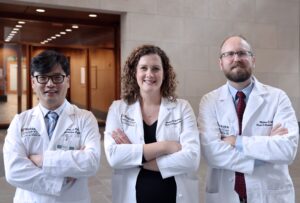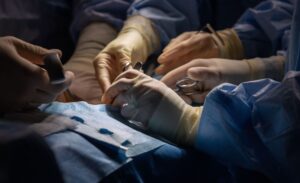In the Lab
Our collective research groups comprise dozens of talented staff and trainees, including medical students, graduate students, research fellows and associates, and international scholars.
Our division has acquired more than $15 million in awards from 2000 to date, and we currently hold $6.5 million in active awards. Cumulatively, we have published more than 1,200 peer-reviewed manuscripts represented on PubMed, as well as more than 100 books and chapters.
General questions regarding our Basic Science Research program should be directed to Dr. Matthew Wood.
Clinical Research Labs
Nerve, Extremity and Wound Reconstruction Lab
Ida K. Fox, MD, and her dedicated, multidisciplinary research team are on a mission to significantly expand treatment options for cervical level spinal cord injuries.
Research in this lab is currently focused on:
- Further defining surgical candidacy and clinical outcomes for peripheral nerve transfer surgery
- Assessment of perception of surgical and nonsurgical interventions
- Development and testing of surgical decision aid comparing nerve and tendon transfer surgery and nonsurgical intervention
- Outreach and education of health care providers, people spinal cord injuries and surrounding communities
Ida K. Fox, MD, is nationally and internationally known for her work to restore hand and upper extremity function in the setting of mid-cervical level spinal cord injury (SCI). Her primary research interests highlight and build upon this clinical work. She has established the protocol for the perioperative testing and counseling of people with cervical level spinal cord injury who are considering nerve transfer surgery in this setting. This novel application of a well-established technique — peripheral nerve transfer surgery — to improve upper extremity and hand function in people with cervical level SCI may significantly expand treatment options in this arena.
A U.S. Department of Defense Grant funds her research work. The Craig H. Neilsen Foundation has funded her research in the past.
Breast and Aesthetic Surgery Lab
Terence Myckatyn, MD, a professor of plastic and reconstructive surgery at Washington University School of Medicine, leads many multidisciplinary research endeavors related to breast and aesthetic surgery. His current research includes the following:
- Shared decision-making in breast reconstruction
Working with collaborators Mary Politi, PhD; Hedwig E. Lee, MA, PhD; Randi Foraker, PhD, MA, FAHA, FAMIA; and Margaret Olsen, PhD, MPH, Myckatyn has developed a web-based clinical decision aid to facilitate shared decision-making in breast reconstruction. - Randomized control trial to compare acellular dermal matrices
Working with Marissa Tenenbaum, MD, Myckatyn is conducting an industry-funded study that compares surgical and patient-reported outcomes between two forms of acellular dermal matrices used in pre- and post-pectoral breast reconstruction. - Randomized control trial to compare impact of antibiotic irrigation and cancer on microbiota of tissue expanders
This study, funded by the Plastic Surgery Foundation, uses next-generation sequencing and advanced microbiological techniques to analyze the impact of cancer and antibiotic irrigation on bacterial biofilm formation on breast-tissue expanders. This work is performed in collaboration with Jennifer Walker, MD, and Blake Hanson, MD, at the University of Texas Health Science Center at Houston (UTHealth). - Analysis of agglutination around breast implants
This study, funded by the Plastic Surgery Foundation, explores the formation of bacterial agglutinins around breast implants, a transition phase between planktonic and biofilm bacteria, and a potential therapeutic target to prevent device-related infection. This work is performed in collaboration with Jennifer Walker, MD, and Blake Hanson, MD, at the University of Texas Health Science Center at Houston (UTHealth). - Genomics of breast implant-associated anaplastic large cell lymphoma
This study, funded by the Aesthetic Surgery Education Research Foundation, explores a potential genetic predisposition to development of BIA-ALCL in patients with macro-textured breast implants, utilizing both whole genome and whole exome sequencing, FISH and other genomic techniques. This work is performed in conjunction with pathology and immunology specialist Eric Duncavage, MD, and oncology specialist Neha Mehta-Shah, MD, at Washington University School of Medicine. - Metabolics of breast implant bacteria
This study investigates whether particular small molecules identifiable in seroma fluid around breast implants can diagnose or predict a clinically relevant infection in some cases, or portend a benign scenario in other cases. This work is performed in conjunction with infectious diseases specialists Margaret A. Olsen, PhD, MPH, and Jeffrey P. Henderson, MD, PhD, at Washington University School of Medicine.
Craniofacial and Pediatric Surgery Lab
Working at the forefront of craniosynostosis and cleft lip and/or palate research, Kamlesh Patel, MD, leads the craniofacial and pediatric research lab at Washington University School of Medicine. This multidisciplinary lab’s groundbreaking work has demonstrated the success of a novel approach to craniosynostosis surgery and continues work to advance pediatric reconstructive research. His work is supported by Children’s Hospital Foundation.
Currently, Patel’s lab focuses on:
- Optimizing value-based multidisciplinary team care for patients with cleft lip and/or palate to significantly reduce patient wait time and unnecessary clinic visits without compromising patient care
- Measuring neurodevelopmental outcomes following endoscope-assisted repair of craniosynostosis
- Imaging skull bones via MRI to eliminate the risk of brain cancer from CT radiation
- Anthropometric and patient-reported outcomes in patients with congenital craniofacial conditions. This work focuses on the interplay between physical appearance and psychological and social factors, taking patient and parent perspectives into account to transform patient care.
Pediatric and Nerve Surgery Lab
The Pediatric and Nerve Surgery Lab is led by Alison Snyder-Warwick, MD, in a multidisciplinary research effort that strives to advance many aspects of pediatric treatment. This lab’s current work includes:
- Improving tools and outcomes for reconstruction of facial nerve deficits
Snyder-Warwick is part of a multidisciplinary, international effort to provide more standardized methods for universal assessment of facial movement. - Defining treatment parameters and assessing outcomes after corneal neurotization
Snyder-Warwick, in partnership with Washington University oculoplastics specialist Steven Couch, MD, FACS, are part of one of only a few teams offering corneal neurotization to patients. Snyder-Warwick devises anatomical projects to improve surgical technique and assess patient outcomes. - Assessing pediatric opioid use and accessibility
- Evaluating gender-related differences in academic plastic surgery
- Determining the impact of multidisciplinary surgical care on pediatric patients
- Improving patient-centered care in multidisciplinary management of patients with cleft lip and/or palate
Basic and Translational Research
Peripheral Nerve Surgical Research Lab
The Peripheral Nerve Surgical Research Lab (PNSRL) is a consortium of investigators with the shared goal of investigating the pathology mechanisms and treatments for peripheral nerve injuries.
Matthew Wood, MD, who directs the lab, and Susan Mackinnon, MD, lead a multidisciplinary team that focuses their research on these main goals:
- Translational advances to treating peripheral nerve injuries
- Understanding the limits to repairing nerve gaps
- Developing approaches to repair large gaps
Susan Mackinnon, MD, leads clinical research to advance the management of nerve-injured patients. Working with Andrew Yee, PhD, Mackinnon also is pursuing video-based learning in nerve surgery, not only to include nerve surgeries themselves, but also to include the component of clinical judgment and patient selection, which is critical to patient safety and quality improvement outcomes. Mackinnon and Yee also are using a web-based approach to investigate the utility of coaching surgeons on patient selection criteria and on their surgical techniques.
The Bioengineering Lab
Research within the Plastic and Reconstructive Surgery Bioengineering Lab focuses on augmenting and improving the surgeon’s capabilities to manage and reconstruct major tissue injuries through developing bioengineered therapies. The basic and translational research conducted in this lab focuses on:
- Bioengineered scaffolds to repair large and long tissue defects
- Therapeutic electrical stimulation protocols to promote regeneration
Xiaowei Li, PhD, develops biomaterials platforms for regenerative medicine, with specific interest in applications of biomaterials for angiogenesis and vascularization, stem cell engineering and tissue regeneration. Li focuses on exploiting bioengineering strategies for tissue regeneration by combining the principles of biomaterial science, biological science, stem cell biology, tissue engineering, regenerative medicine with the advanced techniques in molecular and cell biology, with a goal of developing biomaterial approaches to induce a permissive microenvironment to improve efficiency of stem cell therapies for regeneration of injured/diseased tissues. He also works to apply biomaterial platforms to influence endogenous cell fates to promote functional tissue regeneration.


